| Srl | Item |
| 1 |
ID:
118706
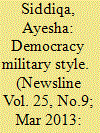

|
|
|
| 2 |
ID:
132162
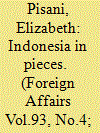

|
|
|
|
|
| Summary/Abstract |
In April, voters in Indonesia's parliamentary elections shocked many observers, confounded most pollsters, and seemed to set back their own long-term interests by failing to deliver a massive victory to the main opposition party, the Indonesian Democratic Party of Struggle. Under the country's complex electoral rules, a party must win 25 percent of the popular vote (or 20 percent of the seats in parliament) before it can formally nominate a presidential candidate. Polls had predicted that the Democratic Party of Struggle would win up to 30 percent of the vote, largely thanks to the massive popularity of the politician the party announced would represent it in the presidential election: Joko Widodo, the governor of Jakarta, who was expected to win that race handily. But his party managed to eke out only 19 percent -- more than any of the 11 other parties in the running, but not enough to cross the threshold. And so Jokowi, as he is widely known, will have to form a coalition to run for president, meaning that if he manages to take the helm of the world's third-largest democracy in July, he'll do so with little power and representing an alliance with no clear platform.
|
|
|
|
|
|
|
|
|
|
|
|
|
|
|
|
| 3 |
ID:
112352


|
|
|
| 4 |
ID:
122853


|
|
|
| 5 |
ID:
122381
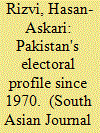

|
|
|
| 6 |
ID:
121052
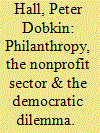

|
|
|
|
|
| Publication |
2013.
|
| Summary/Abstract |
The central dilemma of American democracy is the tension between "voice" and "equality": between the Constitution's unconditional guarantees of citizens' expressive, associational, and property rights and the legal and political equality that is the foundation of majoritarian decision-making. Philanthropy and nonprofit organizations - which enable citizens to give money and time to support causes in which they believe - have posed this dilemma with unusual force, allowing moneyed minorities to oppose and sometimes overwhelm the popular will. In the past, these assertions of private power have inevitably aroused popular opposition producing legislative and regulatory outcomes that have maintained a balance between voice and equality. Today, with unprecedented accumulations of wealth and legal changes permitting the unrestricted use of wealth in politics, the unchallenged exercise of private power through philanthropy and the nonprofit sector poses grave threats to the democratic process.
|
|
|
|
|
|
|
|
|
|
|
|
|
|
|
|
| 7 |
ID:
131690
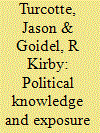

|
|
|
| 8 |
ID:
086303


|
|
|
|
|
| Publication |
2008.
|
| Summary/Abstract |
In his article in International Politics, Harald Müller (2004) attempts to explain why some democracies fight wars through the development of two ideal types of democracy, one that adopts the stance of militant liberalism and the other of pacifist liberalism. This article offers a critique of Müller's argument and his classification of militant and pacifist democracies. As an alternative explanation I turn to empirical uniformities on war that have been identified through quantitative, data-based research as increasing the probability of the onset of war. These factors include power status, duration of independence, number and type of borders, the presence of enduring rivalry, and the level of economic development. I will demonstrate that these factors are more important in explaining the warlike nature of some democracies.
|
|
|
|
|
|
|
|
|
|
|
|
|
|
|
|
| 9 |
ID:
132943
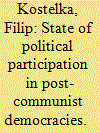

|
|
|
|
|
| Publication |
2014.
|
| Summary/Abstract |
The article assesses the state of political participation in Central and East European post-communist democracies. Incorporating the most recent data, it compares the emerging trends in political participation to those observed in the established democracies of Western Europe. The findings reveal that post-communist citizens participate substantially less than their Western counterparts, and, contrary to some expectations, no convergence has been taking place. This is due to a host of factors, the importance of which seems to vary according to the type of political activity. It is subsequently shown that while political participation is lower than in Western Europe, it is not markedly more biased. The poor state of political participation therefore does not appear to seriously undermine the quality of the post-communist democratic process.
|
|
|
|
|
|
|
|
|
|
|
|
|
|
|
|
| 10 |
ID:
123680


|
|
|
| 11 |
ID:
126078


|
|
|
| 12 |
ID:
115883


|
|
|
|
|
| Publication |
2012.
|
| Summary/Abstract |
The objective of this article is to critically analyse the discourse within the Unified Communist Party of Nepal (Maoist) or known as UCPN (Maoist) since its evolution and find out whether the Maoists have adapted themselves to the democratic process well by using democracy as a tool to achieve their own revolutionary political objectives. The article argues that the internal Maoist discourse reflects that there is no change in the UCPN (Maoist) strategy or political goals. They have only changed their tactics to suit the situation. The changes are also more visible at the organisational rather than the ideological level. Since the party is in transition, they may not opt for another round of violent revolution to achieve their political objectives; they will try their best to achieve them through peaceful means. Since the party has already experimented with the radicals' ideas in 2004-2005, the top leaders will be extra careful in the future about letting the radicals dominate the party.
|
|
|
|
|
|
|
|
|
|
|
|
|
|
|
|
| 13 |
ID:
123143


|
|
|
|
|
| Publication |
2013.
|
| Summary/Abstract |
This article examines the ways in which United Nations (UN) peacekeeping missions affect democratic progress and the durability of peace in post-civil war states. After a conflict, UN peacekeeping missions provide security and create incentives for former actors to resolve their differences through peaceful and democratic means. This article contends that by providing support, peacekeeping missions help to initiate a democratic process such that former rivals can claim access to power and resources without resorting to armed conflict. To arrive at this conclusion, this article empirically examines whether UN peacekeeping missions succeeded in promoting democratic progress in postwar states and, subsequently, whether that democratic progress would contribute to the durability of peace. The indirect effect of peacekeeping on stable peace has not been explored in the literature surrounding democratic progress and the durability of peace. From the analysis of the data on post-civil war democratic progress and the durability of peace from 1946 to 2005, I find support for the alternative approach and conclude that UN missions contribute to durable peace in post-civil war states by promoting democratic political processes.
|
|
|
|
|
|
|
|
|
|
|
|
|
|
|
|